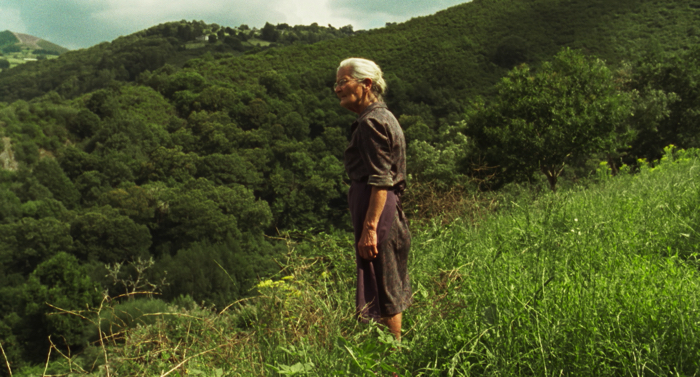




Dir: Oliver Laxe | Wri: Oliver Laxe, Santiago Fillol, Oliver Laxe | DoP Mauro Herce | 90′
One of the strongest films in the Un Certain Regard at Cannes 2019 was this stunning docudrama from Mimosas director Oliver Laxe.
Set in the remote Ancares region in the heart of the Galician mountains Oliver Laxe’s stirring third feature transports us back to a rural way of life where the occupants live in gentle and humble acceptance of nature, eeking out their existence from the land and the animals who live amongst them.
This wild and savagely beautiful part of North East Spain is covered in rain-drenched forests and rolling mountains where the gusty winds can kindle even a small fire and send it raging incandescently through the region decimating flora and fauna. Laxe’s gaze is detached but brooding with sensitivity, inviting us into to this strangely unsettling world.
Amador grew up here with his parents and his respect for the local way of life is palpable. His regular cinematographer Mauro Herce (Dead Slow Ahead) shooting on Super 16, films a row of fir trees cascading to the ground and eventually revealing a massive bulldozer causing widespread mayhem as it moves ominously through the wooded hillside like a behemoth .
Amador (Amador Arias) comes home after serving time for causing a fire that almost wiped out the villagers, not to mention the vegetation and livestock. Set to the sonorous tones of a Vivaldi psalm we can sense this is a bitter homecoming for a middle-aged man with no one but his 83 year old mother Benedicta (Sanchez) to welcome him. She does this with a simple acknowledgement. “Are you hungry?” Both characters are played by non-pros who inhabit their roles with the naturalism professionals
Mother and son continue their day to day life as they left off. Amador is rather harsh on his sweet and obliging mother who runs their smallholding single-handedly, tending their three cows and trudging backwards and forwards with their ageing Alsatian. The other locals in this mournful corner include Inazio (Inazio Abra), who is working on a large-scale refurbishment of his parents’ stone farmhouse. Amador is emotionally buttoned down and taciturn, refusing to rise to the bait when one of the villagers shouts, “Hey Amador, have you got a light?”
There is a solace to this spartan existence drawn by Laxe with moving simplicity. The animals complete their household. Elena (Fernandez) the vet is the only intruder and she arrives to help pull one of their cows out of a ditch. The journey back to her practice is one of poignant beauty and wry humour as Amador once again remains tacitly unfriendly while the cow’s gentle eyes look on trustingly.
This is a minimalist film of rare eloquence. Nothing is forced or spare, the unsettling narrative gradually unfolding with a growing sense of doom as, predictably, the fires come back to the mountains forcing the animals to flee amid devastation, firefighters struggling with the raw power of the mammoth flames. One image that remains seared to the memory is of a horse stumbling bewildered from the wreckage, having been singed by thefla,es. The tiny figure of Benedicta is seen wandering disconsolately across the charred landscape. And we are once again left to ponder Amador’s involvement. Fire Will Come is pure cinema. Set to the atmospheric ambient sounds of nature and full of naturalistic detail and subtle undercurrents, it is joy to behold. MT
NOW ON PRIME VIDEO